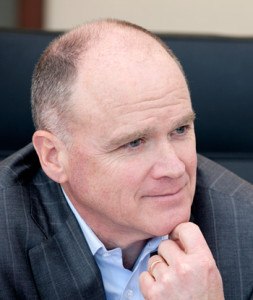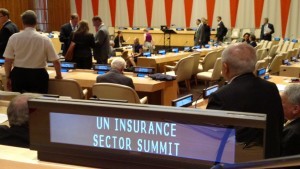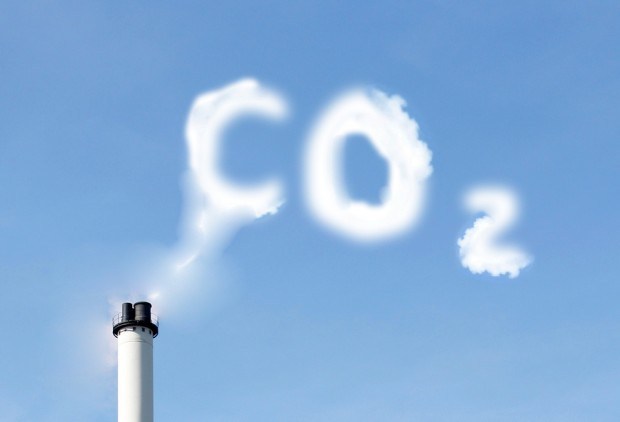Insurers and reinsurers are applying underwriting and risk management expertise to support an environmentally sustainable future, but the question of exactly how they’ll use investment dollars toward that goal stirred up debate at a recent conference.

Michael McGavick, XL Catlin
“The idea that we’re going to divest in carbon is nonsense,” said Mike McGavick, CEO of XL Catlin during a session at the Global Insurance Forum of the International Insurance Society in June.
McGavick was responding to an executive in the audience who challenged a panel of reinsurance executives on stage to defend the makeup of investment portfolios which he said reach into the trillions of dollars across the insurance and pension spaces. “This amount should go toward long-term investments that will guarantee the growth of the world—that means…to invest only in environmental and societal projects that will increase the output while still maintaining sustainable growth.”
McGavick was the only executive on the panel to respond. “It’s just nonsense. It’s too large a part of the economy,” he said. It’s too many of the investible opportunities out there and the reality is that we would be failing our shareholders if we weren’t investing in a prudent way.”
“That’s our responsibility to our shareholders. It is unavoidable and you cannot by wishing it away make it not so.”
He went on to explain how the industry is—and should be—devoting investment dollars and underwriting resources to support alternative energy projects as he addressed a comment from an executive in the audience.
After talking about how policymakers around the globe need and value insurance industry expertise in modeling, estimating and mitigating risk, Sachs told insurers, “You have trillions and trillions of dollars under management and therefore a unique ability and responsibility also to invest in a sustainable way.”
Sachs continued: “We don’t need more coal, oil and gas reserves in this world because the proof is reserves are already far larger than can be safely utilized within the climate carbon budget.
Professor Jeffrey Sachs, Director, Earth Institute at Columbia University
“There is no case for arctic drilling. There is no case for deep sea drilling. There is no case further coal development. There is no case for a Keystone pipeline to carry the oil [tar] sands from Alberta to U.S. refineries because the oil sands do not fit within the two‑degree Celsius upper limit on climate warming,” he said. Earlier in his talk, Sachs had identified the two-degree Celsius limit as the figure that governments around the world agree is “the absolute guardrail of safety on the planet,” although they have yet to take concerted action to make sure the limit is not exceeded.
Sachs, who is also a special advisor to United Nations Secretary-General Ban Ki-moon on the Millennium Development Goals, suggested that insurers take a cue from Norway’s nearly $900 billion government pension fund, considered the largest sovereign wealth fund in the world, which reported in May that it would divest from coal, “placing of all energy sector investments under an ethical set of guidelines.”

The insurance industry can be essential in building a more resilient, climate smart economy.”
Ban Ki-moon, U.N. Secretary-General
Inside the United Nations building in New York City on the last day of the insurance conference, Ban Ki-moon himself called out AXA as a shining example within the insurance industry for others to follow. “AXA recently pledged to decarbonize its assets, increase investments in resilient low–carbon infrastructure and create the innovative financial tools that will make financial markets work for a safer climate,” the Secretary-General reported.
“The insurance sector is well placed to be a leader in risk-sensitive investment” the Secretary-General said, also stressing that governments around the world need to send a “clear signal” to businesses about their commitment to lower carbon levels.
Both Sachs and the U.N. Secretary-General said 2015 is a pivotal year for signals to be delivered, with four major summits on disaster risk reduction and climate change scheduled. In particular, they highlighted a gathering heads of state from governments around the world in September where 17 sustainable development goals will be on the agenda for potential adoption, and the 21st meeting of the Conference of the Parties of the U.N. Framework Convention on Climate Change (COP21) in December.
“In the United Nations, the jargon ‘sustainable development’ means a holistic vision of society that combines economic development, more social inclusion and environmental sustainability,” Sachs said, as he (and the Secretary-General, a day later) spoke about how natural disasters affect the poorest economies disproportionately.
 “I hope that as you hear of this agenda, this will resonate with the insurance industry. To my mind, it is core to your supremely important economic function and to the mechanisms and institutional means that this industry knows how to accomplish, that no other industry knows how to accomplish,” Sachs said, outlining three key insurance activities—modeling, risk management, and investment—where insurers can make a difference.
“I hope that as you hear of this agenda, this will resonate with the insurance industry. To my mind, it is core to your supremely important economic function and to the mechanisms and institutional means that this industry knows how to accomplish, that no other industry knows how to accomplish,” Sachs said, outlining three key insurance activities—modeling, risk management, and investment—where insurers can make a difference.
During his speech, the Secretary-General said that “the insurance industry rose to the challenge in last year’s [U.N.] Climate Summit by announcing a commitment to double its climate-smart investment by the end of 2015,” referring to a pledge that has the industry committing to put $84 billion in green investments by year-end and to a 10-fold increase in climate-smart investments by 2020. (“2014 Climate Change Summary–Chair’s Summary,” Sept. 23, 2014, available at un.org.) “We must ensure that commitments made at the Summit are now implemented,” he said.
More broadly, the Secretary-General shared a key economic insight from last year’s Summit about investors generally. “Investors today do not know whether countries are serious about tackling climate change, or if they are content to allow a high-carbon business with all the risks that climate change imposes on assets and financial instruments. That is one reason why reaching an ambitious climate change agreement in Paris is so important,” he said.
“Government leaders should give correct vision, right direction that this is the place we are going. That is what I am doing as Secretary-General because the United Nations should give clear vision based on science, based on [a] lot of research that climate change is happening and there will be a lot of disaster occurring.”
“Therefore, we should mitigate and we should adapt …I would invite you to do whatever may be necessary in your business,” he said, adding that he was not expecting any executives to change their business priorities. “We are not forcing you, urging you to do business otherwise … I am asking you to invest wisely in the interest of humanity, in the interest of whole world—our nature, our planet earth. This is what I am asking you.”
“I am giving you clear signals that the private sector needs to allocate capital to build a low-carbon economy. The insurance industry can be essential in building a more resilient, climate smart economy.”
Sachs and McGavick agree on this last point.
Saying that insurers and reinsurers won’t divest “is not the same as saying that we can’t make an impact,” McGavick said.
“No investment portfolio will be solely in carbon either. These portfolios will be widely diversified across investable sectors.
“The critical thing is not to ask are you trying to starve the carbon industry of investors—because they will find the other investor quite easily [and] because that’s putting yourself at risk. The question is are you also investing in other technologies and other pathways so there really are opportunities for the society to change its dependence [on coal, oil, and gas]. That is a much more interesting question, I think, worthy of the industry.”
McGavick advocates a focus on a second question as well. “What are we doing to enable alternative [energy] technologies, to advance on our creation of insurance products that make these technologies more resilient?”
“This is a very interesting path” and XL Catlin and other insurers at the Forum are “certainly investing in the intellectual capital to make these technologies more resilient and affordable and [able to] win their own economic competition with carbon rather than somehow artificially regulating how the industry will invest its assets.” (See related article, “Innovation in Bloom at Catlin.)
Contributing to the goal of environmental sustainability in a third way, insurers and reinsurers are reducing their own carbon footprints and “also bending our products towards resilience when there is loss,” he said, offering the replacement on fire-damaged non-LEED buildings with LEED construction as an example, referring to a green building certification (Leadership in Energy & Environmental Design).
“There are a number of things this insurance and reinsurance industry can do to move faster towards a less carbon-dependent world. But the idea of artificial, self-imposed investment boundaries without government requirement—it just won’t happen. And it would be literally a fiduciary failure of the leadership that did so,” McGavick concluded.
Sachs had other ideas about the industry’s potential contributions to a global sustainable development agenda.
“This is the industry that practices the science of risk identification. You model risk. You’ve been there for hundreds of years creating much of the science of probability itself in service of insurance. We have growing risks and shifting probability distributions of extreme events on the planet. We have an interaction of technological and climatological risks. We need the knowledge of this industry to help map these risks, to help them be better known [and] for the industry to speak out, which I haven’t heard very much or certainly not sufficiently on the changing risk patterns coming from anthropogenic change, that is human‑induced change.
He implored insurers: “Explain to the legislature of North Carolina that indeed their sea level is going to rise. That’s going to mean more floods, more storm surges, and loss of property values. Explain to the people of the Southwest and the Midwest that indeed mega‑droughts are on the horizon [that will produce] calamitous losses in agriculture.”
Turning to the industry’s risk management function, Sachs noted that a core function of the insurance is “to press for good behavior of those who appeal for financial assistance.”
“We don’t have that now. When Nepal’s earthquake hit, you find again and again and again that building codes were never developed or never enforced. And of course, there was no financial insurance.”
Sachs concluded: “Governments cannot do this on their own. They can’t even largely do it [at all]. This agenda is too complex. Governments are not good insurers. They are not good risk managers. Governments are led by politicians whose job is taking power.
“Your industry is led on principles of risk diversification and mitigation. It’s led fundamentally on principles of sustainability. The world needs you,” he said.





















 State Farm Mutual to Pay $5B Dividend to Auto Insurance Customers
State Farm Mutual to Pay $5B Dividend to Auto Insurance Customers  10 Do’s and Don’ts of a Smart ORSA Report
10 Do’s and Don’ts of a Smart ORSA Report  The Future of HR Is AI
The Future of HR Is AI  Teens’ First Year on the Road Most Deadly
Teens’ First Year on the Road Most Deadly 

























